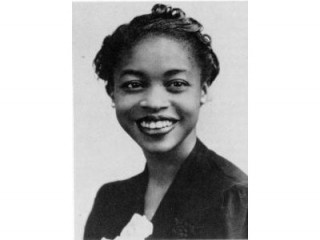
Margaret Walker biography
Date of birth : 1915-07-07
Date of death : 1998-11-30
Birthplace : Birmingham, Alabama, United States
Nationality : American
Category : Famous Figures
Last modified : 2011-11-16
Credited as : novelist, poet, For My People
Margaret Walker, novelist, poet, scholar, and teacher, was best known for her Civil War novel Jubilee (1963) and for her powerful collection of poetry about racial affirmation, For My People (1942).
Margaret Abigail Walker was born on July 7, 1915, in Birmingham, Alabama, to Sigismund and Marion (Dozier) Walker. In 1943 she married Firnist James Alexander (deceased 1983), and they parented four children: Marion Elizabeth, Firnist James, Sigismund Walker, and Margaret Elvira. Walker received her A.B. from Northwestern University (1935) and an M.A. (1940) and Ph.D. (1965) from the University of Iowa. For more than 30 years Walker taught literature at Livingstone College, Salisbury, North Carolina (1941-1942); West Virginia State College (1944-1945); and Jackson State University, Jackson, Mississippi (1949-1979).
In addition to teaching, Walker was a prolific writer. She wrote six books between 1942 and 1974. For My People (1942), a collection of poetry about African American racial pride and heritage, brought her instant recognition. Her Civil War novel Jubilee (1966), begun when she was 19, dramatizes actual historical events from American slavery to Reconstruction as the setting for the fictionalized life of her maternal great-grandmother, Margaret Duggans. This novel was translated into five languages and went through 43 printings. Her other book-length works include Prophets for a New Day (1970), How I Wrote Jubilee (1972), October Journey (1973), and A Poetic Equation: Conversations between Margaret Walker and Nikki Giovanni (1974). Walker also wrote numerous articles on African American literature and culture. Moreover, she recorded her own poetry, as well as selections from the work of Paul Lawrence Dunbar, James Weldon Johnson, and Langston Hughes, on Folkways Records.
Her literary activities won her many honors. In 1942 she received the Yale Series of Younger Poets Award for For My People, followed by the Rosenthal fellowship in 1944, Ford Foundation fellowship in 1954, Houghton Mifflin Literary fellowship in 1966 for Jubilee, Fulbright fellowship in 1971, and National Endowment for the Humanities fellowship in 1972. Walker also held honorary degrees from Northwestern University, Rust College, Dennison University, and Morgan State University.
After retiring from teaching at Jackson State University, Walker devoted full-time effort to her writing. She prepared two books for publication in the 1980s—The Daemonic Genius of Richard Wright, a definitive, critical biography of Wright; and This is My Century, a collection of poetry possessing the power of For My People. Walker also worked on five other book-length manuscripts: Mother Broyer, a novel about a faith healer and cult leader; Goose Island, a collection of short stories; A New Introduction to the Humanities, a textbook; Twentieth Century Afro-American Literature, an anthology; and Minna and Jim, a sequel to Jubilee.
Walker continued to reside in Jackson, Mississippi, where she said she must stay and "write for the rest of [her] life, no matter how short or long it is." In addition to working on the Jubilee she is also writing an autobiography. When she is not writing she lectures on African American literature.
















